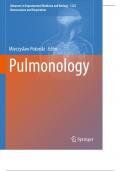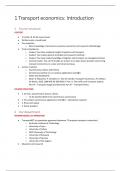Summary
Summary Advances in Experimental Medicine and Biology Neuroscience and Respiration 1222 Pulmonology medical research and clinical practice
- Institution
- 123 University
The book series Neuroscience and Respiration presents contributions by expert researchers and clinicians in medical research and clinical practice. Particular attention is focused on pulmonary disorders as the respiratory tract is at the first line of defense against pathogens and environmental ...
[Show more]




